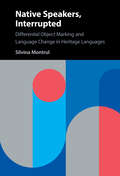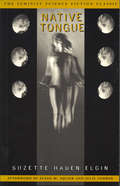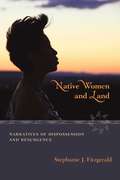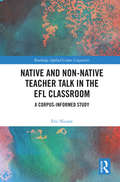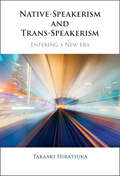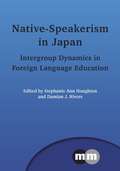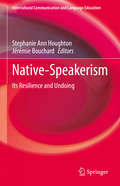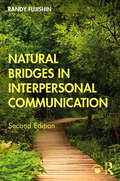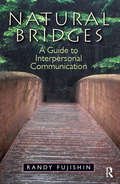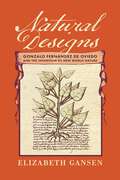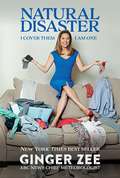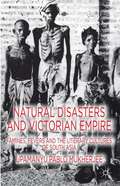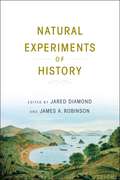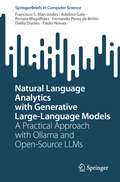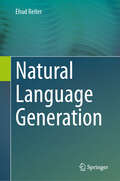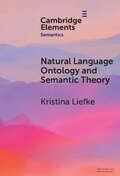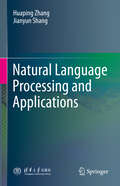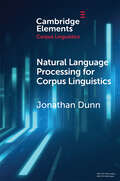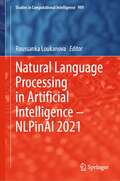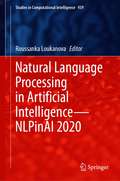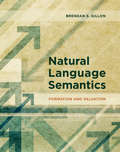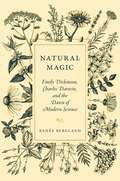- Table View
- List View
Native Speakers, Interrupted: Differential Object Marking and Language Change in Heritage Languages
by Silvina MontrulA heritage language is the term given to a language spoken at home by bilingual children of immigrant parents. Written by a leading figure in the field, this pioneering, in-depth study brings together three heritage languages – Hindu, Spanish and Romanian - spoken in the United States. It demonstrates how heritage speakers drive morphosyntactic change when certain environmental characteristics are met, and considers the relationship between social and cognitive factors and timing in language acquisition, bilingualism, and language change. It also discusses the implications of the findings for the language education of heritage speakers in the USA and considers how the heritage language can be maintained in the English-speaking school system. Advancing our understanding of heritage language development and change, this book is essential reading for students and researchers of linguistics and multilingualism, immigration, education studies and language policy, as well as educators and policy makers.
Native Tongue
by Suzette Haden Elgin Susan SquierCalled "fascinating" by the New York Times upon its first publication in 1984, Native Tongue won wide critical praise and cult status, and has often been compared to the futurist fiction of Margaret Atwood. Set in the twenty-second century, the novel tells of a world where women are once again property, denied civil rights and banned from public life. Earth's wealth depends on interplanetary commerce with alien races, and linguists ---a small, clannish group of families ---have become the ruling elite by controlling all interplanetary communication. Their women are used to breed perfect translators for all the galaxies' languages.Nazareth Chornyak, the most talented linguist of the family, is exhausted by her constant work translating for trade organizations, supervising the children's language education, running the compound, and caring for the elderly men. She longs to retire to the Barren House, where women past childbearing age knit, chat, and wait to die. What Nazareth comes to discover is that a slow revolution is going on in the Barren Houses: there, word by word, women are creating a language of their own to free them from men's control."Native Tongue brings to life not only the possibility of a women's language, but a rationale for one,"--Village Voice"Elgin takes up more than linguistics, of course--everything from religion to sex...the story is absolutely compelling."--Women's Review of BooksSuzette Haden Elgin is author of twelve science fiction novels and is widely know for her best-selling series The Gentle Art of Verbal Self-Defense and for The Grandmother Principles. She is director of the Ozark Center for Language Studies and is professor emerita of linguistics at San Diego State University.Susan Squier is Julia Brill professor of English and Women's Studies at Pennsylvania State University.
Native Tongues: Colonialism and Race from Encounter to the Reservation
by Sean P. HarveyExploring the morally entangled territory of language and race in 18th- and 19th-century America, Sean Harvey shows that whites' theories of an "Indian mind" inexorably shaped by Indian languages played a crucial role in the subjugation of Native peoples and informed the U.S. government's efforts to extinguish Native languages for years to come.
Native Women and Land: Narratives of Dispossession and Resurgence
by Stephanie J. Fitzgerald&“What roles do literary and community texts and social media play in the memory, politics, and lived experience of those dispossessed?&” Fitzgerald asks this question in her introduction and sets out to answer it in her study of literature and social media by (primarily) Native women who are writing about and often actively protesting against displacement caused both by forced relocation and environmental disaster. By examining a range of diverse materials, including the writings of canonical Native American writers such as Louise Erdrich, Linda Hogan, and Elizabeth Cook-Lynn, and social media sites such as YouTube and Facebook, this work brings new focus to analyzing how indigenous communities and authors relate to land, while also exploring broader connections to literary criticism, environmental history and justice, ecocriticism, feminist studies, and new media studies.
Native and Non-Native Teacher Talk in the EFL Classroom: A Corpus-informed Study (Routledge Applied Corpus Linguistics)
by Eric NicaiseNative and Non-Native Teacher Talk in the EFL Classroom explores and compares the linguistic features of native and non-native English teacher talk with the aid of corpus linguistics. Setting aside the wide range of audio and video materials available, the EFL teacher is in many instances the main model of English to which students are exposed in secondary-level education. The basis of this book is to work towards a framework for the language that teachers of English need to be proficient in, based on an empirical study of language used in the ELT classroom by both native and expert non-native users. Presenting a corpus-informed treatment of the precise linguistic features used by EFL teachers within the framework of their most common teaching functions, this book: • Relates directly to the teacher talk of secondary-level EFL teachers; • Combines quantitative and qualitative approaches to data analysis; • Looks into pedagogical implications for ELT and proposes a flexible language development model based on evidence from the teacher training classroom; • Provides a corpus-based repertoire of language for the classroom which is of relevance to native and non-native student-teachers and practising teachers. Highlighting the need for much greater awareness of the impact of language use in both learning and teaching, this book is a major resource for advanced students and researchers of TESOL, classroom discourse, corpus linguistics, ELT, English for professional purposes, and teaching placement preparation.
Native-Speakerism and Trans-Speakerism: Entering a New Era
by Takaaki HiratsukaNative-speakerism is a deeply embedded prejudice that perpetuates unequal power dynamics in language education. By introducing the liberating concept of trans-speakerism, this innovative book dismantles prevalent biases and reshapes the discourse in the field. It proposes inclusive designations such as global speaker of English (GSE), global teacher of English (GTE), and global Englishes researcher (GER), and urges a shift away from labels that maintain marginalization. By systematically reviewing previous studies, it challenges native-speakerism, and seeks to advance diversity, equity, and inclusion for all language speakers, teachers and researchers – transcending the limitations imposed by speakerhood statuses. The volume features the voices of non-native English-speaking (NNES) secondary school teachers, graduate students, and university professors in Japan, highlighting the strengths, interests, and uniqueness of language practitioners and researchers – both intellectually and emotionally. It ultimately encourages all language educators, researchers, and policymakers to oppose biases, welcome linguistic diversity, and develop inclusive language education environments.
Native-Speakerism in Japan
by Stephanie Ann Houghton Damian J. RiversThe relative status of native and non-native speaker language teachers within educational institutions has long been an issue worldwide but until recently, the voices of teachers articulating their own concerns have been rare. Existing work has tended to focus upon the position of non-native teachers and their struggle against unfavourable comparisons with their native-speaker counterparts. However, more recently, native-speaker language teachers have also been placed in the academic spotlight as interest grows in language-based forms of prejudice such as 'native-speakerism' - a dominant ideology prevalent within the Japanese context of English language education. This innovative volume explores wide-ranging issues related to native-speakerism as it manifests itself in the Japanese and Italian educational contexts to show how native-speaker teachers can also be the targets of multifarious forms of prejudice and discrimination in the workplace.
Native-Speakerism: Its Resilience and Undoing (Intercultural Communication and Language Education)
by Stephanie Ann Houghton Jérémie BouchardThis book explores native-speakerism in modern language teaching, and examines the ways in which it has been both resilient and critiqued. It provides a range of conceptual tools to situate ideological discourses and processes within educational contexts. In turn, it discusses the interdiscursive nature of ideologies and the complex ways in which ideologies influence objective and material realities, including hiring practices and, more broadly speaking, unequal distributions of power and resources. In closing, it considers why the diffusion and consumption of ideological discourses seem to persist, despite ongoing critical engagement by researchers and practitioners, and proposes alternative paradigms aimed at overcoming the problems posed by the native-speaker model in foreign language education.
Natives against Nativism: Antiracism and Indigenous Critique in Postcolonial France (Muslim International)
by Olivia C. HarrisonExamining the intersection of Palestine solidarity movements and antiracist activism in France from the 1970s to the present For the pasty fifty years, the Palestinian question has served as a rallying cry in the struggle for migrant rights in postcolonial France, from the immigrant labor associations of the 1970s and Beur movements of the 1980s to the militant decolonial groups of the 2000s. In Natives against Nativism, Olivia C. Harrison explores the intersection of anticolonial solidarity and antiracist activism from the 1970s to the present.Natives against Nativism analyzes a wide range of texts—novels, memoirs, plays, films, and militant archives—that mobilize the twin figures of the Palestinian and the American Indian in a crossed critique of Eurocolonial modernity. Harrison argues that anticolonial solidarity with Palestinians and Indigenous Americans has been instrumental in developing a sophisticated critique of racism across imperial formations—in this case, France, the United States, and Israel.Serving as the first relational study of antiracism in France, Natives against Nativism observes how claims to indigeneity have been deployed in multiple directions, both in the ongoing struggle for migrant rights and racial justice, and in white nativist claims in France today.
Natural Bridges in Interpersonal Communication
by Randy FujishinRandy Fujishin’s Natural Bridges in Interpersonal Communication, Second Edition is a concise, practical, and reader-friendly book that introduces students to the basic concepts and skills of interpersonal communication. The book presents the fundamental tools necessary to effectively communicate in face-to-face and online interactions in personal and professional life settings. Fujishin’s approachable writing style engages students, inviting them to consider how best to approach their own opportunities to communicate with others. New to this edition, each chapter includes a discussion of foundational research, with suggestions for further reading and online resources. This textbook is designed for Communication Studies, Business, and Career and Trade courses at the community college and four-year university level. Online instructor materials that accompany the book include an instructor manual, sample exams, and a sample class schedule. <P><P><i>Advisory: This book offers only partial accessibility. We have kept it in the collection because it is useful for some of our members. Benetech is actively working on projects to improve accessibility issues such as these in the future.</i>
Natural Bridges: A Guide to Interpersonal Communication
by Randy FujishinNatural Bridges is a concise, practical, inexpensive, and student-friendly guide to interpersonal communication. This book explores the fundamental principles and skills necessary for effective communication. Building on the theme that our every word and behavior contributes to building a bridge or a barrier in our daily interactions with others, Natural Bridges provides students with concepts and real-world guidelines for productive communication with acquaintances, friends, family-members, romantic partners, and co-workers.
Natural Designs: Gonzalo Fernández de Oviedo and the Invention of New World Nature (The Early Modern Americas)
by Elizabeth GansenNatural Designs chronicles the life and work of the earliest and most influential Spanish historian of the New World, Gonzalo Fernández de Oviedo (1478–1557). Through a combination of biography and visual and textual analysis, Elizabeth Gansen explores how Oviedo, in his writings, brought the European Renaissance to bear on his understanding of New World nature.Oviedo learned much from the humanists with whom he came into contact in the courtly circles of Spain and Italy, including Giovanni Battista Ramusio and Pietro Bembo, and witnessed Christopher Columbus regaling Queen Isabel and King Ferdinand with news from his inaugural voyage to the Indies. Fascinated by the Caribbean flora and fauna Oviedo encountered on his arrival to the Caribbean in 1514, he made them the protagonists of his writings on the Indies. From his consumption of the prickly pear cactus, which led him to believe his death was imminent, to the behavior of the iguana, which defied his efforts to determine if the lizard was fish or flesh, his works reveal the challenges at the heart of Spain’s encounter with the biological wonders of the Americas.Natural Designs foregrounds Oviedo’s role as a writer, illustrator, and editor of New World nature. As much as Oviedo is credited as a pioneer in the literary genre of American natural history, his contributions to early modern conceptions of the flora and fauna of the Indies are still not widely understood and appreciated. Gansen situates us in the early sixteenth century to reappraise the works of the Spanish historian who first shaped these realities.
Natural Disaster: I Cover them. I am one.
by Ginger ZeeGinger grew up in small-town Michigan where she developed an obsession with weather as a young girl. Ginger opens up about her lifelong battle with crippling depression, her romances that range from misguided to dangerous, and her tumultuous professional path.
Natural Disasters and Victorian Empire
by Upamanyu Pablo MukherjeeNatural Disasters and Victorian Empire looks at the relationship between epidemics and famines in south Asia and Victorian literature and culture. It suggests that much of how we think today about disasters, state and society can be traced back to the 19th-century British imperial experience.
Natural Experiments of History
by Jared Diamond James A. RobinsonIn eight case studies by leading scholars in history, archaeology, business, economics, geography, and political science, the authors showcase the natural experiment or comparative method-well-known in any science concerned with the past-on the discipline of human history. That means, according to the editors, comparing, preferably quantitatively and aided by statistical analyses, different systems that are similar in many respects, but that differ with respect to the factors whose influence one wishes to study. The case studies in the book support two overall conclusions about the study of human history: First, historical comparisons have the potential for yielding insights that cannot be extracted from a single case study alone. Second, insofar as is possible, when one proposes a conclusion, one may be able to strengthen one’s conclusion by gathering quantitative evidence (or at least ranking one’s outcomes from big to small), and then by testing the conclusion’s validity statistically.
Natural Language Analytics with Generative Large-Language Models: A Practical Approach with Ollama and Open-Source LLMs (SpringerBriefs in Computer Science)
by Paulo Novais Dalila Durães Francisco S. Marcondes Adelino Gala Renata Magalhães Fernando Perez de BrittoThis book explores the application of generative Large Language Models (LLMs) for extracting and analyzing data from natural language artefacts. Unlike traditional uses of LLMs, such as translation and summarization, this book focuses on utilizing these models to convert unstructured text into data that can be processed through the data science pipeline to generate actionable insights. The content is designed for professionals in diverse fields including cognitive science, linguistics, management, and information systems. It combines insights from both industry and academia to provide a comprehensive understanding of how LLMs can be effectively used for natural language analytics (NLA). The book details practical methodologies for implementing LLMs locally using open-source tools, ensuring data privacy and feasibility without the need for expensive infrastructure. Key topics include interpretant, mindset and cultural analysis, emphasizing the use of LLMs to derive soft data—qualitative information crucial for nuanced decision-making. The text also outlines the technical aspects of LLMs, including their architecture, token embeddings, and the differences between encoder-based and decoder-based models. By providing a case study and practical examples, the authors show how LLMs can be used to meet various analytical needs, making this book a valuable resource for anyone looking to integrate advanced natural language processing techniques into their data analysis workflows.
Natural Language Generation
by Ehud ReiterIn late 2022, the prominence of Natural Language Generation (NLG) surged with the advent of advanced language models like ChatGPT. While these developments have captivated both academic and commercial sectors, the focus has predominantly been on the latest innovations, often overlooking the rich history and foundational work in NLG. This book aims to provide a comprehensive overview of NLG, encompassing not only language models but also alternative approaches, user requirements, evaluation methods, safety and testing protocols, and practical applications. Drawing on decades of NLG research, the book is designed to be a valuable resource for both researchers and developers, offering insights that remain relevant far beyond the current technological landscape. Natural Language Generation focuses on data-to-text but also looks at other types of NLG including text summarization. The book takes a holistic approach to NLG, looking at requirements (what users are looking for), design, data issues, testing, evaluation, safety and ethical issues as well as technology. The holistic approach is unique to this book and is very valuable for people building real-world NLG systems, and for academics and researchers who are interested in applied NLG. The author, who previously co-authored a seminal NLG book in 2000, emphasizes high-level concepts and methodologies, ensuring the material's longevity and utility. The book is structured to balance technical depth with practical relevance, including chapters on rule-based and neural NLG approaches, user requirements, rigorous evaluation techniques, and safety considerations. Real-world applications, particularly in journalism, business intelligence, summarization, and medicine, are explored to illustrate NLG's potential and scalability. With personal anecdotes and examples from the author's experiences, this book provides a unique and engaging perspective on the evolving field of NLG, making it an indispensable guide for those looking to harness the power of language generation technologies.
Natural Language Ontology and Semantic Theory (Elements in Semantics)
by Kristina LiefkeThis Element gives an introduction to the emerging discipline of natural language ontology. Natural language ontology is an area at the interface of semantics, metaphysics, and philosophy of language that is concerned with which kinds of objects are assumed by our best semantic theories. The Element reviews different strategies for identifying a language's ontological commitments. It observes that, while languages share a large number of their ontological commitments (such as to individuals, properties, events, and kinds), they differ in other commitments (for example, to degrees). The Element closes by relating different language and theory-specific ontologies, and by pointing out the merits and challenges of identifying inter-category relations within a single ontology.
Natural Language Processing and Applications
by Huaping Zhang Jianyun ShangThis book gives a comprehensive introduction to natural language processing (NLP) and its applications, covering the topics of multimodal data processing, Chinese word segmentation, new word discovery, named entity recognition, keyword analysis, and knowledge graph construction in terms of semantic analysis. The inaugural chapter provides an overview of NLP, and the subsequent chapters delve into the foundations of artificial intelligence, covering traditional deep learning algorithms and platforms. The book then evolves to showcase the latest advancements in deep learning, addressing bottlenecks and unfolding developments from data-oriented, training-oriented, and application-oriented perspectives. Part II of the book navigates the practical applications of intelligent language processing. From web crawlers and multi-format document parsing to speech text recognition, readers gain insights into real-world scenarios. Each chapter provides examples and analyses, empowering readers to bridge theoretical knowledge with hands-on application, unlocking the transformative potential of AI through intelligent language processing. This book serves as a comprehensive resource for researchers, graduate students, and undergraduates in the field of natural language processing. Additionally, it offers valuable insights as a reference for engineers, technicians, and enthusiasts interested in the realm of big data intelligence. The translation was done with the help of artificial intelligence. A subsequent human revision was done primarily in terms of content.
Natural Language Processing for Corpus Linguistics (Elements in Corpus Linguistics)
by Jonathan DunnCorpus analysis can be expanded and scaled up by incorporating computational methods from natural language processing. This Element shows how text classification and text similarity models can extend our ability to undertake corpus linguistics across very large corpora. These computational methods are becoming increasingly important as corpora grow too large for more traditional types of linguistic analysis. We draw on five case studies to show how and why to use computational methods, ranging from usage-based grammar to authorship analysis to using social media for corpus-based sociolinguistics. Each section is accompanied by an interactive code notebook that shows how to implement the analysis in Python. A stand-alone Python package is also available to help readers use these methods with their own data. Because large-scale analysis introduces new ethical problems, this Element pairs each new methodology with a discussion of potential ethical implications.
Natural Language Processing in Artificial Intelligence — NLPinAI 2021 (Studies in Computational Intelligence #999)
by Roussanka LoukanovaThe book covers theoretical work, approaches, applications, and techniques for computational models of information, language, and reasoning. Computational and technological developments that incorporate natural language are proliferating. Adequate coverage of natural language processing in artificial intelligence encounters problems on developments of specialized computational approaches and algorithms. Many difficulties are due to ambiguities in natural language and dependency of interpretations on contexts and agents. Classical approaches proceed with relevant updates, and new developments emerge in theories of formal and natural languages, computational models of information and reasoning, and related computerized applications. Its focus is on computational processing of human language and relevant medium languages, which can be theoretically formal, or for programming and specification of computational systems. The goal is to promote intelligent natural language processing, along with models of computation, language, reasoning, and other cognitive processes.
Natural Language Processing in Artificial Intelligence—NLPinAI 2020 (Studies in Computational Intelligence #939)
by Roussanka LoukanovaThis book covers theoretical work, applications, approaches, and techniques for computational models of information and its presentation by language (artificial, human, or natural in other ways). Computational and technological developments that incorporate natural language are proliferating. Adequate coverage encounters difficult problems related to ambiguities and dependency on context and agents (humans or computational systems). The goal is to promote computational systems of intelligent natural language processing and related models of computation, language, thought, mental states, reasoning, and other cognitive processes.
Natural Language Semantics: Formation and Valuation
by Brendan S. GillonAn introduction to natural language semantics that offers an overview of the empirical domain and an explanation of the mathematical concepts that underpin the discipline.This textbook offers a comprehensive introduction to the fundamentals of those approaches to natural language semantics that use the insights of logic. Many other texts on the subject focus on presenting a particular theory of natural language semantics. This text instead offers an overview of the empirical domain (drawn largely from standard descriptive grammars of English) as well as the mathematical tools that are applied to it. Readers are shown where the concepts of logic apply, where they fail to apply, and where they might apply, if suitably adjusted. The presentation of logic is completely self-contained, with concepts of logic used in the book presented in all the necessary detail. This includes propositional logic, first order predicate logic, generalized quantifier theory, and the Lambek and Lambda calculi. The chapters on logic are paired with chapters on English grammar. For example, the chapter on propositional logic is paired with a chapter on the grammar of coordination and subordination of English clauses; the chapter on predicate logic is paired with a chapter on the grammar of simple, independent English clauses; and so on.The book includes more than five hundred exercises, not only for the mathematical concepts introduced, but also for their application to the analysis of natural language. The latter exercises include some aimed at helping the reader to understand how to formulate and test hypotheses.
Natural Magic: Emily Dickinson, Charles Darwin, and the Dawn of Modern Science
by Renée BerglandA captivating portrait of the poet and the scientist who shared an enchanted view of natureEmily Dickinson and Charles Darwin were born at a time when the science of studying the natural world was known as natural philosophy, a pastime for poets, priests, and schoolgirls. The world began to change in the 1830s, while Darwin was exploring the Pacific aboard the Beagle and Dickinson was a student in Amherst, Massachusetts. Poetry and science started to grow apart, and modern thinkers challenged the old orthodoxies, offering thrilling new perspectives that suddenly felt radical—and too dangerous for women.Natural Magic intertwines the stories of these two luminary nineteenth-century minds whose thought and writings captured the awesome possibilities of the new sciences and at the same time strove to preserve the magic of nature. Just as Darwin&’s work was informed by his roots in natural philosophy and his belief in the interconnectedness of all life, Dickinson&’s poetry was shaped by her education in botany, astronomy, and chemistry, and by her fascination with the enchanting possibilities of Darwinian science. Casting their two very different careers in an entirely fresh light, Renée Bergland brings to life a time when ideas about science were rapidly evolving, reshaped by poets, scientists, philosophers, and theologians alike. She paints a colorful portrait of a remarkable century that transformed how we see the natural world.Illuminating and insightful, Natural Magic explores how Dickinson and Darwin refused to accept the separation of art and science. Today, more than ever, we need to reclaim their shared sense of ecological wonder.
Natural Partners (Focus Forward #Orange Level)
by Alan Trussell-CullenNatural partners are animals or plants that live or work together to help themselves and each other.
